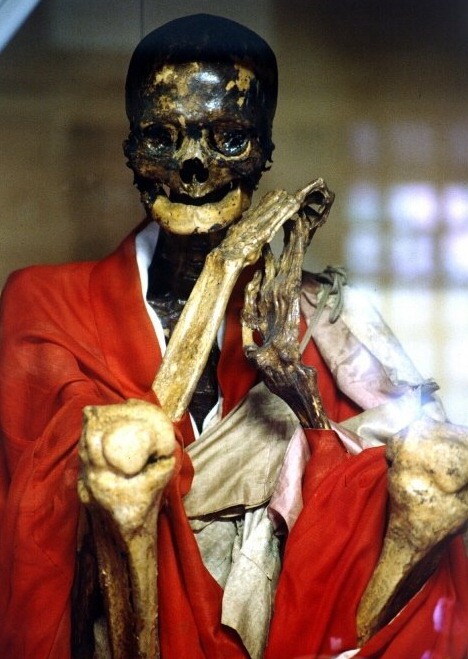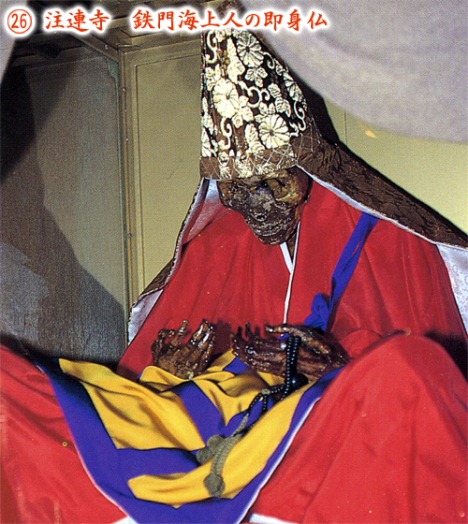Scattered throughout Northern Japan around the Yamagata Prefecture are two dozen mummified Japanese monks known as Sokushinbutsu, who caused their own deaths in a way that resulted in their mummification. The practice was first pioneered by a priest named Kuukai over 1000 years ago at the temple complex of Mount Koya, in Wakayama prefecture. Kuukai was founder of the Shingon sect of Buddhism, which is the sect that came up with the idea of enlightenment through physical punishment. A successful mummification took upwards of ten years. It is believed that many hundreds of monks tried, but only between 16 and 24 such mummifications have been discovered to date.
The elaborate process started with 1,000 days of eating a special diet consisting only of nuts and seeds, while taking part in a regimen of rigorous physical activity that stripped them of their body fat. They then ate only bark and roots for another thousand days and began drinking a poisonous tea made from the sap of the Urushi tree, normally used to lacquer bowls.
Photo credit: Ken Jeremiah
This caused vomiting and a rapid loss of bodily fluids, and most importantly, it made the body too poisonous to be eaten by maggots. Finally, a self-mummifying monk would lock himself in a stone tomb barely larger than his body, where he would not move from the lotus position. His only connection to the outside world was an air tube and a bell. Each day he rang a bell to let those outside know that he was still alive.
When the bell stopped ringing, the tube was removed and the tomb sealed. After the tomb was sealed, the other monks in the temple would wait another 1,000 days, and open the tomb to see if the mummification was successful. If the monk had been successfully mummified, they were immediately seen as a Buddha and put in the temple for viewing. Usually, though, there was just a decomposed body.
The mummies also possess the accessories they had prior to death. However, their eyes have been removed. Even so, they are considered able to see into the souls of the living and be able to perceive reality perfectly.
The practice is now outlawed by the government of Japan and not practiced today by any Buddhist sect.
Photo credit: Ken Jeremiah
Photo credit: Ken Jeremiah
Photo credit: Ken Jeremiah



















And you get a tourist attraction. A way to stay remembered? About ten years it took. That's a lot of time. Was there an age limit at which you could start? Japanese Longevity. When they got to 100 y.o. they got bored of it. Interesting story.
ReplyDeleteI counted quickly and I got almost 8 and a half years. That's a long time.
DeleteAnything wrong with being able to view of human history? They obviously wanted their bodies to stay that way for a reason, and look, there they are, being untouched still.
Deleteok thats wierd
ReplyDeleteThere is a great book on the subject called Living Buddhas: The Self-Mummified Monks of Yamagata, Japan by Ken Jeremiah. I highly recommend it if you like this subject.
ReplyDeleteTo what purpose did this serve??
ReplyDeletebeing a badass
Deletea purpose of self, that's all
DeleteIt was considered the highest form of enlightenment. Buddhahood
Deleteas much as I want to understand it, I'll never understand it as much as someone who was raised in that culture and who is surrounded by it from birth, but you have to try to empathize with their spiritual beliefs in order to understand the purpose, this is the extreme of self discipline and mind over matter, ultimate transcendence, these monks become a Buddha through this process which is hard to understand for a westerner
DeleteIt was to escape this reality. We are living in Purgatory technically just so you know ;)
DeleteThis place is hell it was a way to cross over into the heavenly realms.
@ Formosus
DeleteYou are an uncultured jackass. Try understanding buddhism. The cycle of life and reincarnation is but eternal suffering, they are all striving towards nirvana to be free of it. The body is of no importance, it is only a shell. They don't care about death as they believe in reincarnation and possible ascension to buddhahood.
I don't believe a Buddhist would call somebody "an uncultured jackass."
DeleteI don't believe he ever even implied that he is a Buddhist
Deletejust to let you know this is an ancient Hindu practice called 'samadhi' Numerous Hindu monks called Guru (yes the word guru is of Indian origin which means master) have taken Samadhi by voluntarily giving up food and water and have achieved Sainthood. The most famous of these Gurus is Sri Raghavendra Swami, who has taken Samadhi in 1600s in Mantralaya - just before the British set up base in India as the east India company.
ReplyDeleteActually you are dead wrong, both religions have practiced this in the past, do your research before you claim someone's ignorance! I am a theology major and my professor assigned this subject to us a few weeks ago. Both religions practiced this and both saw it as sacred, becoming a high prophet, AND as a spiritual and righteous way to cross over into the next plain.
Deletetheir souls must be powerful, if they had the (discipline?) to achieve this..
ReplyDeleteYou know what would suck? If the monk had had changed his mind on the 3rd 1000 day trial, and knowing he'd have to ring the bell everyday just to keep the air tube in, as I assume he has no way out once he's inside the tomb. (Considering that he locked himself in) So say he didn't ring the bell that day because he was too weak to do so, and couldn't speak out when they did remove the air tube and sealed the tomb.
ReplyDeleteThis may explain the difference between those who turned themselves into a mummy and those who do not.
Delete3 years eating only roots and seeds, 3 years of poisoning, days or months of walling in a self grave ... plenty of time to change their minds, but when the death comes, and the mind freak out ... sorry, your flesh will rot without turning into a mummy, try next time ^_^